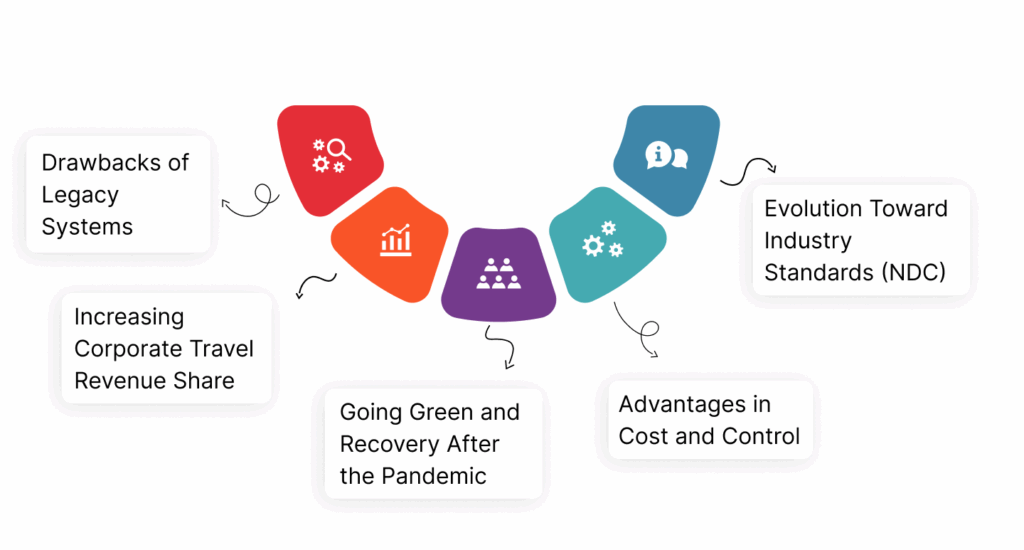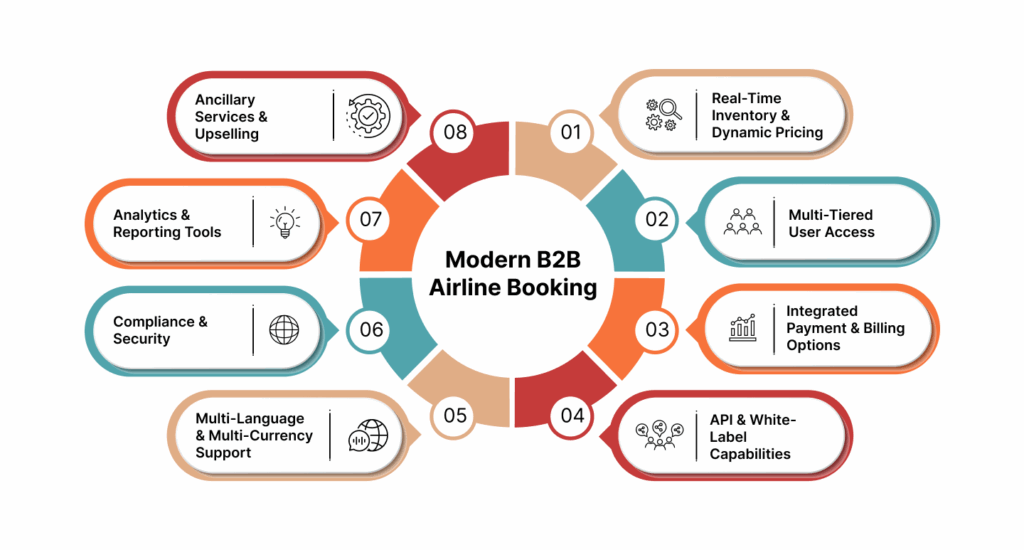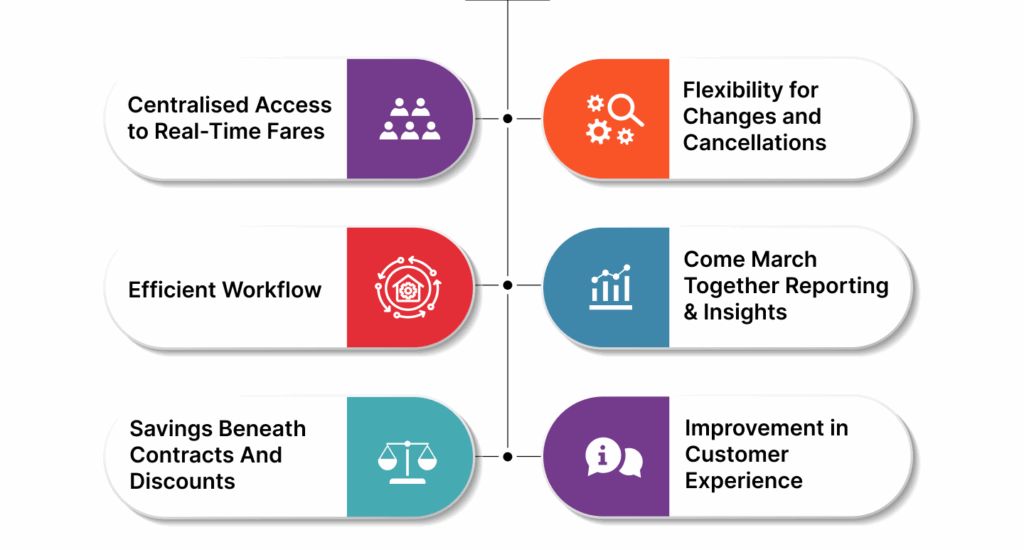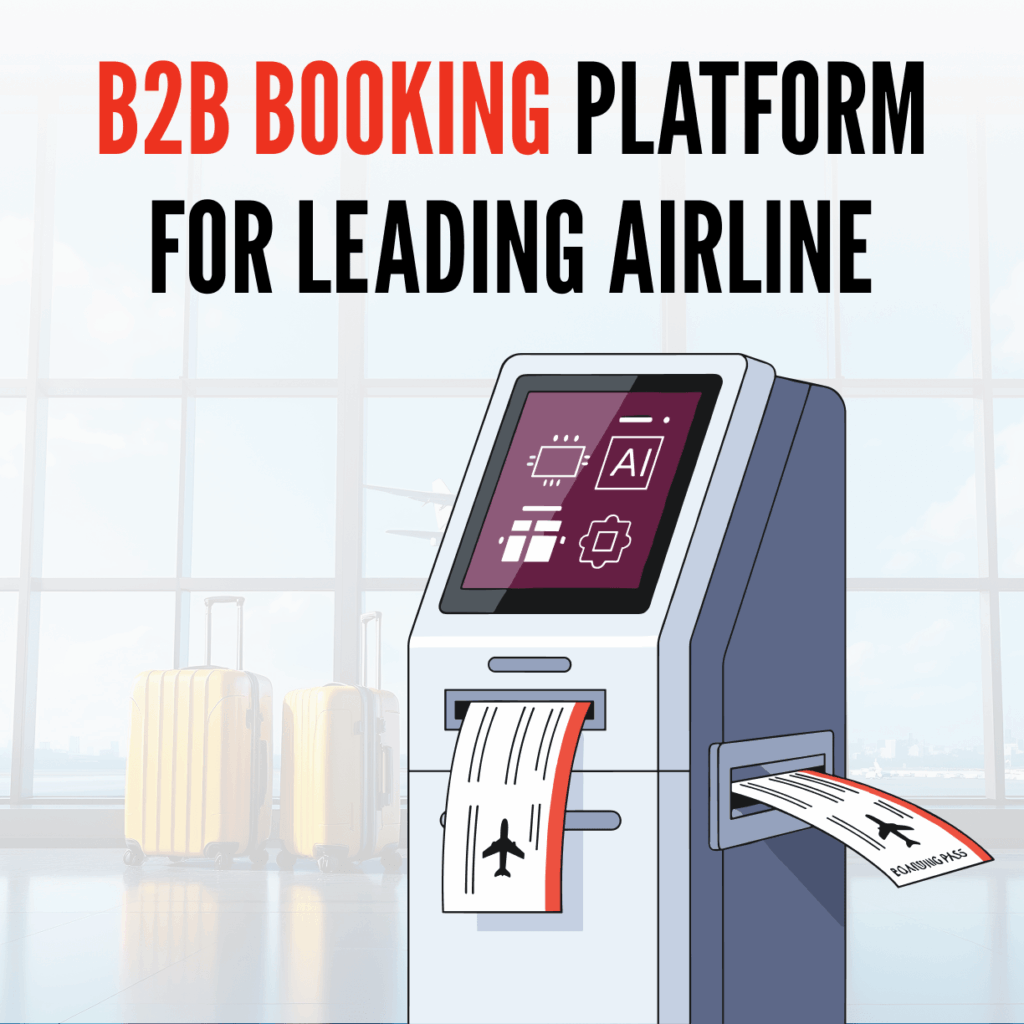|
Getting your Trinity Audio player ready...
|
The opened skies turned digitally forward with a growth perspective that considers partners as important as passenger bookings. Because the common perception about an airline is consumer ticket sales, many might not realise that a significant amount of revenue on B2B—corporate travel managers, agencies, and distribution partners that need more than just flight availability—exits the system. They need a seamless way to access negotiated fares, manage complex itineraries, and handle billing at scale.
That is why the top airlines are abandoning legacy thinking and investing in new-generation B2B booking platforms. Real-time access to inventory and dynamic pricing and integrated payment solutions are offered on such platforms, which in turn reduce operational overhead. Importantly, they give airlines more control. Overdistribution Meanwhile, agencies and corporate users will continue to work in an exceptionally efficient manner.
With things like the industry’s New Distribution Capability (NDC) under IATA, businesses coming back into the travel fold, and margins down to the pressure, the booking platform now only stands as a ‘must-have’ centre of modern airline thinking. Companies like Esferasoft work hand in hand with airlines in the design and deployment of these ‘next-generation’ solutions that will keep them ahead of the industry.
Why Airlines Need a Dedicated B2B Booking Platform
Airlines have always used a combination of GDS systems with some manual booking. All these would be outdated in today’s rapidly changing travel environment. With the correct approach, a modern B2B booking platform would identify the deficiencies and set the process into motion by suggesting tangible benefits:

Increasing Corporate Travel Revenue Share
Business travel is a major revenue stream for airlines, and thus, corporate clients and agencies want to use a platform that provides negotiated fares, flexible options, and merged itineraries.
Drawbacks of Legacy Systems
Voice calls, emails, and archaic portals make it slower to get things done. So, a B2B booking platform replaces these inefficiencies with real-time inventory, dynamic pricing, and automated approvals.
Advantages in Cost and Control
With direct B2B platforms, airlines can reduce their dependency on expensive intermediaries and also strengthen their relationship with the agencies and corporates.
Evolution Toward Industry Standards (NDC)
With IATA’s New Distribution Capability (NDC), the whole aspect in which distribution will change is going to occur, and these specialised B2B platforms are best poised to support these modern requirements.
Going Green and Recovery After the Pandemic
Corporate clients are now concerned about eco-friendly travel. This trend is being matched by features of carbon-tracking travel platforms coupled with smarter routes, which will also help airlines optimise their revenue recovery post-COVID-19.
Core Features of a Modern B2B Airline Booking Platform
A B2B booking platform must, to add real value, combine reliability, flexibility, and innovation. The following features are those with which leading airlines are mostly concerned today:

1. Real-Time Inventory & Dynamic Pricing
- Corporate partners and agencies expect instant access to accurate schedules, seat maps, and negotiated fares.
- Dynamic pricing helps the airline to manipulate airfares according to demand, competition, or loyalty agreements.
- Example: Lufthansa’s NDC platform guarantees this access, allowing agents to engage in real time with exclusive corporate bundles rather than waiting in the legacy GDS systems.
2. Multi-Tiered User Access
- Travel managers, subagencies, and corporate administrator users must each have their customised dashboards.
- Access based on roles creates transparency: approvers see only what they truly need, while agencies can manage bulk bookings without any effort.
- For example, a corporate tool from Emirates allows a travel manager to set the travel policies of that employee beforehand rather than getting manual approvals.
3. Integrated Payment & Billing Options
- Features like invoicing, credit lines, multi-currency appropriation, and secure online payments reduce financial friction.
- Automated reconciliation avoids disputes and makes settlements faster.
- Example: American Airlines has adopted a B2B platform that allows for invoice flexibility up to multinationals booking across regions.
4. Ancillary Services & Upselling
- Besides flight reservations, corporations often reserve baggage, Wi-Fi, lounges, carbon offsets, and seat upgrades.
- Ancillary booking through the platform will bring in extra revenue and form a one-stop experience.
- Example: Etihad Airways mandates travel agencies to provide ancillary services at the time of booking so that the corporations can plan on all costs from the outset.
5. API & White-Label Capabilities
- With an API, one can plug their airline inventory directly into their portals. White-label enables travel agencies to brand the booking interface, while airlines keep control of content and pricing.
- With this, the reach is enhanced without dilution of the airline’s brand identity.
6. Analytics & Reporting Tools
- Real-time dashboards that provide booking trends, high-performing routes, and partner performance.
- Due to consolidated reporting across various departments and geography, Corporates are availed of a benefit.
- Airlines employ this information to streamline schedules, run specialised promotions, and upgrade loyalty programmes.
7. Compliance & Security
- Corporate travel compliance with local tax regulation, GDPR, as well as payment compliance (PCI-DSS), is by no means simple or straightforward.
- B2B booking platforms will include some compliance checks to limit risk for both airlines and partners.
8. Multi-Language & Multi-Currency Support
- Global agencies and corporates want localisation. The multi-language interfaces and multiple currency support platforms really help create a seamless international experience.
- Example: Qatar Airways’ B2B system is tailored for Asia, Europe, and the Middle East.
How Airlines Gain from B2B Booking Platforms
A B2B booking platform does not only serve as a tool for ticket sales but also as a strategic investment that redefines the way airlines engage with their partners, set distribution channels, and earn revenues. Key benefits include the following:
1. Increased Revenue Opportunities
- Agency and corporate sales directly from the airline without margined cut-off costs to intermediaries.
- Other ancillary parts, for example, luggage and lounge passes or service upgrade options, will easily be integrated.
- Dynamic pricing will ensure that fares are competitive while maximising yields per seat.
- As an example, “With an increase in upsell options through its B2B booking tools, United Airlines had measurable growth in ancillary revenue.”
2. Stronger Relationships with Partners
- Booking tools should be friendly with airlines while interfacing with agencies and corporate clients, as it attracts them to transact with them.
- Such exclusive offers as negotiated contracts and personalised dashboards make loyalty to dedicated platforms.
- It also aids in making direct engagement into longer bonds of partnership while reducing dependency on GDS systems.
3. Operational Efficiency and Cost Saving
- Through self-booking flows by automating booking, approval, and payments of airlines shrink the administrative hindrance of call centres and back-office teams.
- Self-service options for agencies and corporates reduce the volume of manual error fixes and long-time requests.
- Reducing GDS dependency will lessen the distribution fees.
4. Data-Driven Application
- The company will acquire all data on booking behaviours about routes preferred for both corporate and individual business travel, best travel seasons, and all kinds of ancillary uptake and preferences of the company.
- Data will help with smarter route planning, targeted promotion, and loyalty strategy.
- For example, Delta will use the B2B booking data to review which corporate contracts are underused due to failed bookings and make real-time adjustments.
5. Agility and Competitive Edge
- As the demand ebbs and flows globally, an airline should have a platform to quickly launch campaigns, modify a price, or open new routes at very short notice.
- B2B platforms offer the flexibility and agility that legacy systems simply cannot do, giving airlines a leg up against competition in local and international markets.
6. Reduce Risk, Compliance
- In-built checks on the tax regulations, enforcement of travel policies, and payment security (PCI-DSS, GDPR) reduce the compliance risk.
- The automated audit trails improve corporate reporting while enhancing trust between airlines and partners.
Benefits for B2B Partners (Agencies, Corporates, TMCs)
A B2B booking platform is not only a win for airlines—it is equally transformative for the partners who depend upon it daily. Travel agencies, corporate travel managers, and travel management companies (TMCs) reap concrete advantages that ease operations and strengthen their fit within the travel ecosystem.

1. Centralised Access to Real-Time Fares
- Agencies and corporates can view live schedules, negotiated rates of fares, and seat availability in real time.
- Essentially, both the back-and-forth communication with clients and changes in bookings can be minimised, thereby allowing maximum accuracy from the word ”go”.
- For example, body-corporate clients hire the Qatar Airways B2B portal to view their contracted fares without any GDS intervention.
2. Efficient Workflow
- The time taken by corporate travel management to obtain an approval has been reduced significantly with auto-approval processes having a pre-set travel policy.
- The agencies can now book together multiple travellers or group itineraries in one directory.
- Modifications by self-service reduce the dependency on the airline call centres.
3. Savings Beneath Contracts And Discounts
- The control of the corporate sector on travel budgets has improved at present because of the availability of discounts and loyalty benefits already set.
- Agencies can pass on savings to clients, making them even more competitive.
4. Flexibility for Changes and Cancellations
- Modern business-to-business platforms make quick rebookings, cancellations, or itinerary adjustments easily accessible.
- The installation of such flexibilities is important to corporates when it comes to managing last-minute changes of business travellers.
5. Come March Together Reporting & Insights
- Such partners can avail themselves of more advanced reporting dashboards that would provide them visibility into spend route preferences and traveller behaviour.
- TMCs make use of the data to optimise client policies, whereas corporates monitor the internal budget compliance of employees.
6. Improvement in Customer Experience
- Through a streamlined booking interface, agency and corporate customers will be able to provide better travel experiences to employees and end customers alike.
- Swift booking, clear pricing, and added services such as seat upgrades or carbon offset options boost customer satisfaction and loyalty.
Challenges Airlines Face in Implementing B2B Platforms
The benefits conferred on airlines through the use of B2B booking platforms are obvious, but these airlines still have to contend with hurdles in their adoption and implementation. These hurdles are often rooted in tensions existing between modernity and antiquation in their processes alongside balancing the interests of different stakeholders.
Integration with Legacy System
Airlines have invested for decades in Global Distribution System (GDS) and antiquated internal booking tools. Migration of data, synchronising schedules, and ensuring business-as-usual operations require robust design and strong APIs for the integration mix. If regional subsidiaries or partner airlines were to rely on different systems, the challenge would be elevated even more.
Resistance from Intermediaries
Direct B2B platforms can be seen as a competitive threat to traditional GDSs and other distribution partners. They would continue to oppose it in the form of lobbying, contractual limits, and reluctance to exchange information, which would generally cause friction during the actual rollout process. Therefore, the airlines have to tread a very thin line – gain independence without cutting out the cooperative relationships.
Compliance and Regional Regulations
Airline distribution runs through lots of jurisdictions with their own laws on data protection, consumer rights, and financial reporting. Beyond the Payment Card Industry Data Security Standard or even GDPR compliance for Europe and for regional tax reporting in Asia or even in the Middle East, compliance becomes quite complicated for platforms in deployment.
Balancing Direct Distribution vis-a-vis Partnership.
A direct B2B channel means more control and cost-cutting for the airlines, but agencies and travel management companies will still hold onto their value as partners. Airlines need to strike a balance between providing their platform with sufficient exclusivity and value, without alienating the intermediaries. Balance is the keystone of a well-functioning distribution ecosystem.
Redefining Airline Partnerships in the Digital Sky

They are no longer the ‘nice-to-have’ B2B booking platforms – they form the bedrock of airline distribution in the modern context. Basically, real-time inventory, dynamic pricing, integrated payments, and big data all work to change how the airline industry is evolving with corporate clients, agencies, and TMCs. It is not only a technology upgrade but rather a strategic transformation that strengthens partnerships, unlocks revenue-generating opportunities, and ensures compliance across a global market.
Adopting the new-age B2B booking platform isn’t an easy path for airlines; it is indeed a challenge, but it has many opportunities within it. It is this shift that will provide a competitive edge to all those who adopt it and lend to future sustainability and equitable relations to thrive with the connected travel ecosystem.
At Esferasoft, we work with airlines in designing, building, and deploying B2B booking engines that meet today’s distribution requirements. Our API integration, compliance frameworks, and end-user design specialisation mean that airlines can get off their legacy systems and onto future-proof solutions that place them well ahead of the competition. However, the skies continue to be unpredictable. They will be agile, confident, and successful partner-to-partner in integrating Esferasoft as their technology partner. To find out more, call us now at +91 772-3000-038!

